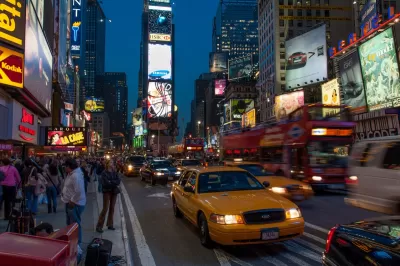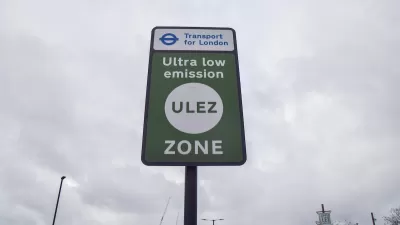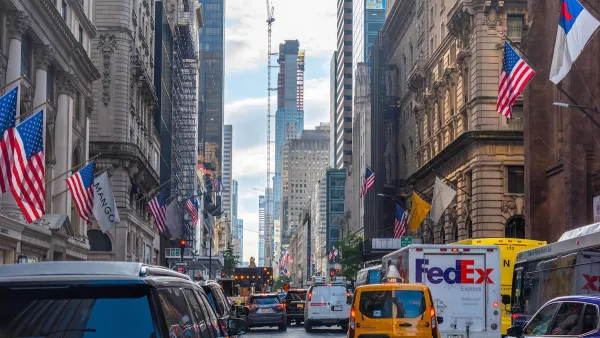The known quantity of the EZ Pass system could prevent innovations in congestion pricing that would prevent the challenges since London enacted a similar policy.

Flavie Halais digs into some of the specifics of New York City congestion pricing plan, which is still more than a year away from implementation but taking shape. One key point, the system's use of essentially the same E-ZPass toll system that’s already used on New York’s roads, bridges, and tunnels, has raised concern with critics. To understand why, Halais cites the example of London.
In 2003 the British capital introduced a £11.50 flat fee for vehicles entering a 13-square-mile zone in the city center between 7 am and 6 pm on weekdays. The number of cars driving through Central London fell sharply, but began rising again when ride-hailing apps like Uber appeared in 2012. Private-hire vehicles were exempt from the charge, and as their number increased, so did traffic. This slowed the bus system, in turn leading more people to abandon public transit.
London attempted some changes to the policy, as documented by Halais, but challenges persist. The lesson for New York City, according to Halais, "They should think about vehicle size, or number of passengers, distance travelled, and what other options are available to those who do drive." The E-ZPass system won't allow the kinds of dynamic pricing schemes recommended here, and some experts are calling it a missed opportunity.
FULL STORY: NYC Has an Old-Timey Plan to Fix Its Traffic Future

Maui's Vacation Rental Debate Turns Ugly
Verbal attacks, misinformation campaigns and fistfights plague a high-stakes debate to convert thousands of vacation rentals into long-term housing.

Planetizen Federal Action Tracker
A weekly monitor of how Trump’s orders and actions are impacting planners and planning in America.

In Urban Planning, AI Prompting Could be the New Design Thinking
Creativity has long been key to great urban design. What if we see AI as our new creative partner?

San Francisco Mayor Backtracks on Homelessness Goal
Mayor Dan Lurie ran on a promise to build 1,500 additional shelter beds in the city, complete with supportive services. Now, his office says they are “shifting strategy” to focus on prevention and mental health treatment.

How Trump's HUD Budget Proposal Would Harm Homelessness Response
Experts say the change to the HUD budget would make it more difficult to identify people who are homeless and connect them with services, and to prevent homelessness.

The Vast Potential of the Right-of-Way
One writer argues that the space between two building faces is the most important element of the built environment.
Urban Design for Planners 1: Software Tools
This six-course series explores essential urban design concepts using open source software and equips planners with the tools they need to participate fully in the urban design process.
Planning for Universal Design
Learn the tools for implementing Universal Design in planning regulations.
Gallatin County Department of Planning & Community Development
Heyer Gruel & Associates PA
JM Goldson LLC
Mpact (founded as Rail~Volution)
City of Camden Redevelopment Agency
City of Astoria
Jefferson Parish Government
Camden Redevelopment Agency
City of Claremont





























